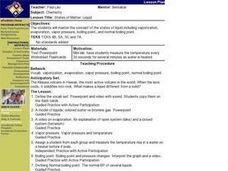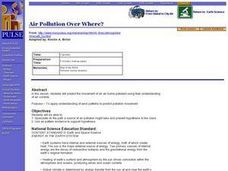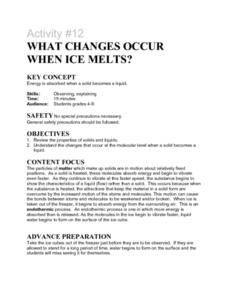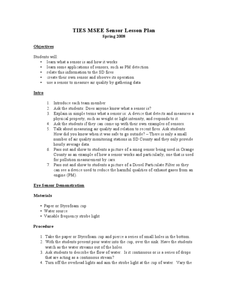Curated OER
Maintaining Body Heat
Learners observe and compare heat loss in various objects with surface area-to-volume ratios and transfer this comparison to the physical characteristics of animals in their environment. In small groups they conduct an experiment...
Curated OER
Float My Boat
Fourth graders, in groups, experiment with density and the displacement of water by creating and designing their own boats and seeing which boat holds the most centimeter cubes without sinking..
Curated OER
Is Air a Fluid?
Students discuss the physical properties of fluids and then demonstrate that air carbon dioxide and oxygen) is a fluid by creating currents.
Curated OER
Goofy Putty
Students examine mixtures and solution properties by making a borax polymer. In this chemical reactions lesson, students make a putty out of borax solution mixed to create a polymer.
Curated OER
Phases of Matter
Students describe the motion of solids, liquids and gases. In this chemistry lesson, students describe how temperature affect motion of the particles. They determine the physical properties of each phase.
Curated OER
Construct with Solids
Students discover which properties of solids lend themselves to building a tower through hands on trial and error and observation of others as they are building. They write down the steps it took them to build the tower and label an...
Curated OER
Reading Around the World
Students use the internet to identify the seven continents. Using maps, they locate and identify major physical features of Earth. They are read different books by various authors on the Earth and answer questions related to it. They...
Curated OER
Chemical Bonding
Eighth graders identify the three main types of chemical bonds. In this chemistry lesson, 8th graders draw Lewis dot diagrams of elements and determine the bond formed. They create a model water molecule.
Curated OER
"For the Birds" [part I]
Students identify birds that appear in Chinese and Japanese art, learning about
their physical characteristics, classifying them according to scientific principles, and exploring their habitats and migration patterns. This is part one...
Curated OER
States of Matter: Liquid
Students work in a mini lab where they measure the temperature every 30 seconds for several minutes as water is heated. They are asked what makes liquid different from a solid. Students view a PowerPoint on the model of liquids,...
Curated OER
LONGSHORE EROSION
Middle schoolers research the concept of the erosional effects of the longshore current. The use of a demonstration is used to illustrate the physical process of erosion. Students remain engaged in the lesson with the use of this...
Curated OER
A Message in a Bottle
Young scholars investigate the motion of water currents by mapping the possible movement of messages cast into the ocean in bottles.They accurately plot the appearance of bottles on a world map and illustrate the flow of an ocean...
Curated OER
Introduction to the Barnegat Bay Estuary
Students research estuaries. For this estuaries lesson, students discuss the differences in a bay and an ocean. Students watch a PowerPoint of the properties of the estuaries and geography of Barnegat Bay. Students complete a worksheet...
Curated OER
Air Pollution Over Where?
Students predict the movement of an air borne pollutant using their understanding of air currents. They determine which governments and/or communities should be contacted to be forewarned. They also explore the properties of their...
Curated OER
Get Down With Density
Students define density and observe that things that are less dense than water will float. Students find the density of copper, iron and aluminum
Curated OER
Forest Management
Students analyze physical and biological changes in the Sequoia forest ecosystem, especially logging and fire management practices. They evaluate the controversy of how logging and fire management should be conducted in the Giant Sequoia...
Curated OER
The Teaching of Biology and Difference
Seventh graders pretend they were Anton looking through the microscope for the first time. They describe the way he felt when he observed tiny moving objects in the sample of pond water. They look at their own samples of pond water,...
Curated OER
Periodic Table & Its Trends-Day 1
Learners are introduced to the periodic table. They find the common trends among the electron configurations and the names of certain groups of the table. Students explore the atomic mass, atomic number, mass number, mass and charge...
Curated OER
What Changes Occur When Ice Melts?
Young scholars explore the physical process of melting. They observe melting ice and answer questions related to energy transfer during phase changes.
Curated OER
Sand, Sand, Everywhere Sand
Students study the physical characteristics of four types of desert regions. In this desert regions lesson, students watch a video about deserts and discuss the deserts. Students compare the deserts and research the ways humans have...
Curated OER
Tree Cookie Combat
Fourth graders discover what trees need to live and grow in the environment. They realize that trees sometimes interact or compete with other organisms as well as each other. They identify the physical characteristics of Utah's...
Curated OER
Waves: Sound and Light
A few definitions related to waves open this slide show. Note that the information only covers light waves even though the title mentions sound. Correct the title before using this resource. Another mention is a set of photos of a class...
Curated OER
TIES MSEE Sensor Lesson Plan
Learners explain how a sensor works. In this technology lesson, students determine the air quality around their school. They record observations and share results to class.
Curated OER
Lotic Environment
Students assemble a classroom river model as an example of a lotic system. They control and measure biotic and abiotic information for the in-class system and compare data with a lotic system in a natural environment.



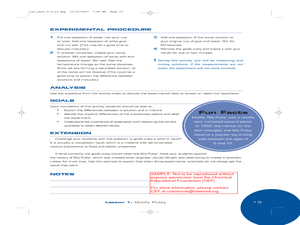


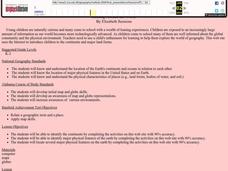

!["For the Birds" [part I] Lesson Plan "For the Birds" [part I] Lesson Plan](http://content.lessonplanet.com/resources/thumbnails/122462/large/cgrmlwnvbnzlcnqymdeymtaxny0ynji5lwd4n2h5by5qcgc.jpg?1414222903)
